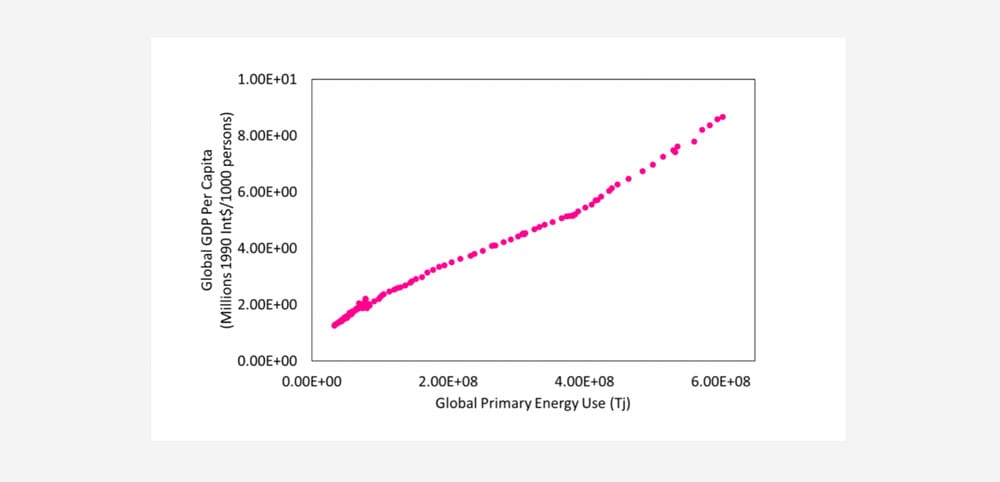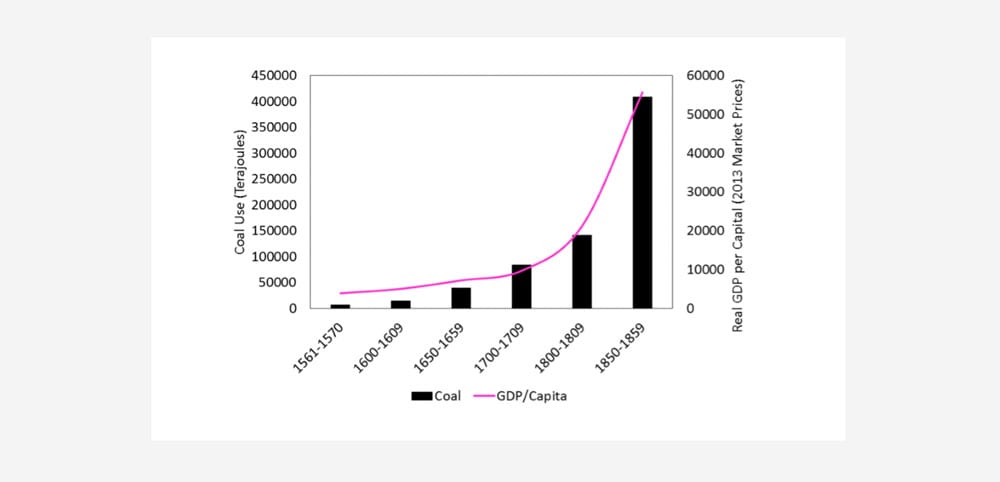Productivity, energy and climate change—a view on the links
Falling productivity growth, climate change and changes in energy supply. We face serious challenges now and in the coming years. A recent paper by CUSP researchers Shimaa Elkomy, Simon Mair and Tim Jackson reviews connections between these three challenges and look for paths forwards. Here, Simon Mair is summarising the findings.

Falling productivity growth, climate change and changes in energy supply. We face serious challenges now and in the coming years. In our recent paper we review connections between these three challenges and look for paths forwards.
Challenges.
Labour productivity growth is falling, and no-one knows why. Typically, policymakers and academics point to bad management practices, not enough of the ‘right’ kind of education, and a lack of investment following the 2008/9 financial crisis. But the data show that UK labour productivity growth has been in decline for much longer than this. Labour productivity growth rates peaked in the UK in the 1960’s and have been falling ever since.
Climate change is the result of 300 years of fossil fuel use. Fossil fuels still form the basis of global capitalism today. Around 80% of global energy use today is fossil fuels. There is no way to avoid catastrophic climate change without dramatically changing the global energy system.
We face changes in the energy supply regardless of climate change. Fossil fuels form the basis of our economies because they are extremely high quality sources of energy. But their quality is declining.
One way to measure energy quality is the metric ‘Energy Return on Energy Invested’ (EROI). EROI measures the amount of energy we get out for every unit of energy we put in to an energy generation process. Imagine building a campfire. One measure of EROI would be the heat and light energy that comes from burning the wood divided by the energy it took you to chop the wood. The same process can be applied to the extraction of fossil fuels. Gas and oil that is close to surface and easy to extract requires only a little energy to extract. Alternative oil and gas production (like shale gas, or tar sands) is much more involved. Consequently we have to use more energy to generate energy.
It is in the context of these three challenges that we brought together experts from economics, engineering, and energy studies to explore the possible links between energy and productivity. The resulting review suggests that there are many possible links, but that in many cases we do not have robust evidence for or against them.
Connections.
Productivity, energy and climate change have all been extensively studied. Proposed links between them are numerous. However, these links have been studied much less than each of their individual counterparts. Where they have been studied this has tended to be in fairly narrow ways—taking one perspective or method and accepting or refuting the link on the basis of that alone. Consequently, pinning links down and accepting or rejecting them proved to be extremely difficult.
The troubles start with the very definition of productivity. At our first workshop, participants were clear that the productivity measure we use is extremely important. Most measures of productivity use market valuation as their output measure. This limits analyses to those tools and techniques developed to analyse markets. This dictates a very particular relationship between energy and productivity that is unable to fully explore the ways that energy is used in the home, and other non-market settings.
That said, even using market metrics we can observe long run relationships between energy use and productivity:


What is harder is explaining why we see this relationship. Economic historians have constructed compelling explanations based on Marxist theories (fossil energy use was shaped by the social forces of capitalism and used to discipline and organise labour) and based on neoclassical theories (fossil fuels became widely used because wages rose and made labour more expensive than energy use). There is little agreement between these camps.
One of the most studied of the potential energy-productivity links is that between physical capital and energy. Physical capital is the machinery and infrastructure that is used to produce goods for the market. Ecological economists argue that capital must use energy to produce anything. A factory without energy can no more produce goods than a factory without workers. Consequently they argue that all else equal we should expect energy use to increase as the amount of capital increases. Mainstream economists argue against this. They suggest that new capital uses energy more efficiently. So as the amount of capital increases, we should see less energy used.
The literature that tackles the energy-capital relation in depth is large, technical and dry. We reviewed 76 papers making 106 estimates of the relationship between capital and energy. The results are inconclusive. ~60% support the mainstream, ~20% the ecological economists and ~20% are inconclusive. This is despite the fact that the analyses all use strikingly similar methods (80% use the same type of model!). The problems are fundamental. The data is unreliable; the models rely on unreasonable assumptions; and analysts use different interpretations of underpinning concepts, making results difficult to compare.
There is a large literature looking at links between energy prices and productivity. Key channels proposed here are the potential inflationary effects of energy price rises, effects via expectations, adjustment costs, and the marginal productivity of labour. But again, there are difficulties in proving any of these channels or their relative importance empirically.
A burgeoning literature examines links between climate change and productivity. There is good empirical evidence that climate change will harm labour productivity. But little on the ways it may impact capital productivity. Moreover, the extent of impacts in either case is heavily dependent on the basic assumptions made by the analyst. One model predicts little impact and another a large impact. The difference is in the assumptions. Assumptions that are rarely justified, and often hard to defend.
Into the future
All this uncertainty makes it difficult to assess just how the changes we expect in energy supply will impact on productivity. It has been suggested that declining EROI will reduce productivity. But in large part this depends on the way that energy and capital interact, or the way that prices will push through into the economy.
This is especially problematic given that transformative change in energy supply and use is needed. Small scale incremental attempts to reduce energy demand have failed. Radical changes are needed if we are to avoid catastrophic climate change: 2 trillion dollars of fossil fuel related capital investment has to go. Without a better understanding of the basic relationships between energy and production it is hard to say how such changes will play out in the wider economy, and almost impossible to prepare to face them.


